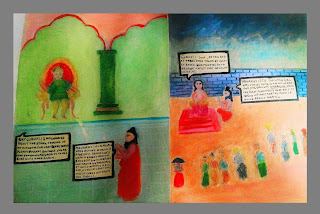Ignorance perpetuates the cycle of births and deaths; Knowledge breaks the vicious circle and liberates the being into the Supreme Consciousness. But out of illusion, human beings are prone to feel that these worldly things are pleasant and ever lasting. In fact there is no pleasure at all in this for, the seeming happiness is highly volatile. On the other hand, the 'bound' beings are not fortunate to have the ever blissful life at ease of 'others' - the detached seekers. However, having awareness about the spiritual reality of one's existence, there is the way of being happy in this material world by attaining detachment.
By saying that the bound people in this mundane world can not have the grace of the Almighty, as they point their finger towards the Almighty for their woeful conditions, Annamacharya tries to caution the bound to come out of the sorrowful situation through his sankeertana, "Itte Sansari Kediyu Ledaya".
'For the ignorant ones bound in the material world there is no happiness.He will only suffer but can not reach other side of the shore.
'For those carrying heavy weights on their back, there is chance of unloading by their side and take rest for a while. But for worldly person there is no such chance of respite for, he can not unload his luggage of worries any where.
'If a person by chance consumes the bitter neem (margosa), he can within no time come out of the awkward situation by swallowing any sweetmeats. But for the bound one it is no way of coming over the bitter difficult conditions. For him there is no chance of counter balancing sweet things in the material life leading.
'One who ekes out his livelihood by working in the fowl smelling garbage and toilets, can, after completion of his job, bathe and cleanse himself thoroughly and apply perfumes to his body to nullify the bad odours. But for the bound there is no such chance of cleansing. So long as he is ignorant about the true knowledge, the Almighty can not bestow grace upon him.'
Through this sankeertana the poet tries to awaken, with some note of caution, the bound in this transitory material world. It is worthwhile for those who are neck deep in their false pleasures. But at the same time we should acknowledge the optimistic approach of the poet savant who on many occasions had clearly tried to awaken us in coming out of the Great Illusion of this material world and seek refuge in the Almighty Within for our Salvation.
In this context let us have some knowledge about the classification of people in this world in to four categories by Sri Ramakrishna Paramahansa. When a fisherman casts his net in the waters, the fish caught in the net feeling the muddy surrounding think they are safe and heavenly within that net 2. some fish realise the bondage and make some effort to jump out of the net 3. Some fish by making serious effort succeed in jumping out of the net and slip away into the waters. and 4. Some fish are shrewd enough to be
aware of the net and avoid it totally by keeping far away from it. In this allegory, God is the fisherman casting net called bondage of 'wealth and women' in the waters called 'sansara sagara' (worldly matters). 1. Those who are complacent in the illusion of worldly pleasures are first category of bound fish; 2. People making effort to escape from net are 'Mumukshuvu' (aspiring for liberation); 3. Those who successfully jump out are the 'Jivanmukta' (liberated) and 4. those who are shrewd enough keeping away from the worldly bondages are 'Nitya Mukta' (Ever Free) like Narada and Swamy Vivekananda.
Thus having clear awareness of the destiny of the first category of the bound fish - Kitchen; we shall leave no stone unturned in our efforts for becoming 'Jivanmukta' !
Baddha, Mumukshuvu, Jivanmukta, Nitya Mukta !
(1 Bound , 2 Aspiring for Liberation, 3 Liberated, 4 Ever Free)
Om Shanti!














